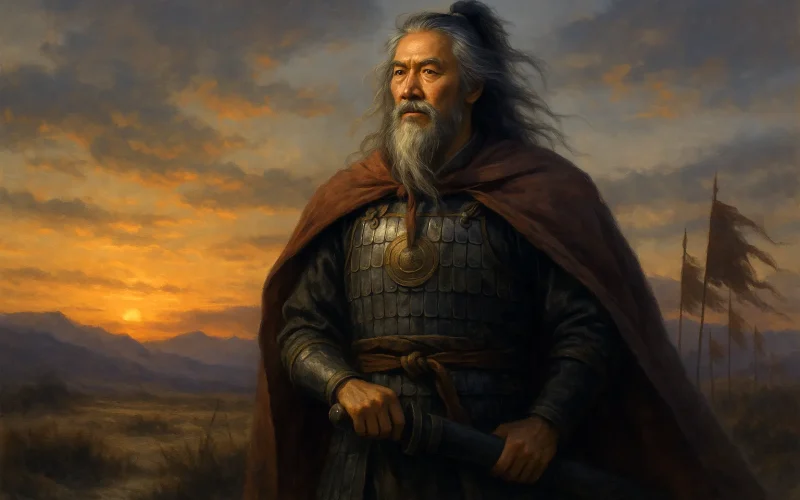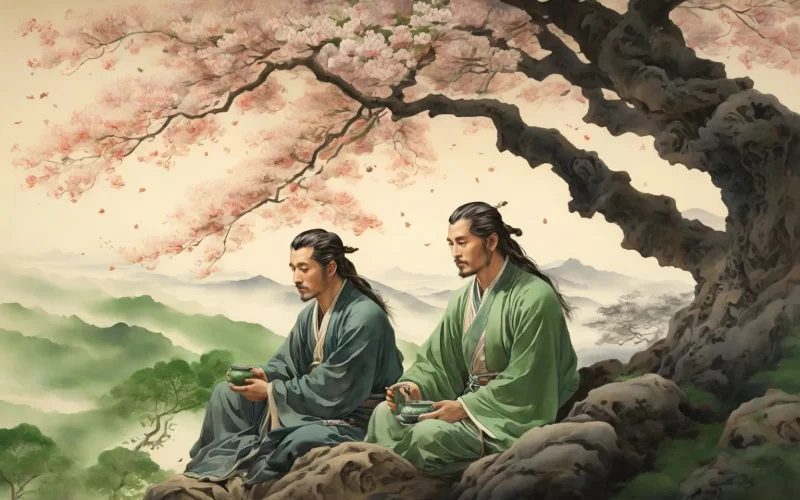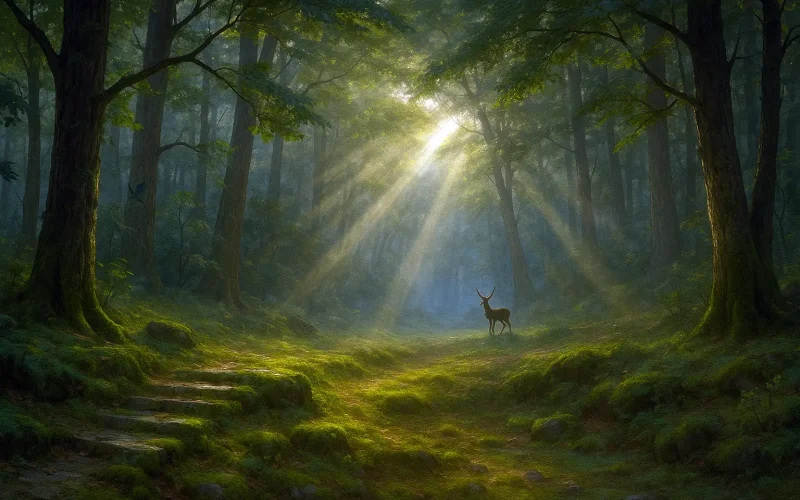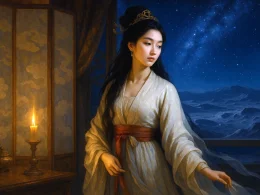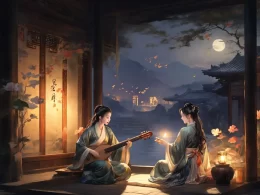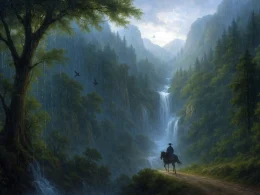When he was a youth of fifteen or twenty,
He chased a wild horse, he caught him and rode him,
He shot the white-browed mountain tiger,
He defied the yellow-bristled Horseman of Ye.
Fighting single- handed for a thousand miles,
With his naked dagger he could hold a multitude.
...Granted that the troops of China were as swift as heaven's thunder
And that Tartar soldiers perished in pitfalls fanged with iron,
General Wei Qing's victory was only a thing of chance.
And General Li Guang's thwarted effort was his fate, not his fault.
Since this man's retirement he is looking old and worn:
Experience of the world has hastened his white hairs.
Though once his quick dart never missed the right eye of a bird,
Now knotted veins and tendons make his left arm like an osier.
He is sometimes at the road-side selling melons from his garden,
He is sometimes planting willows round his hermitage.
His lonely lane is shut away by a dense grove,
His vacant window looks upon the far cold mountains
But, if he prayed, the waters would come gushing for his men
And never would he wanton his cause away with wine.
...War-clouds are spreading, under the Helan Range;
Back and forth, day and night, go feathered messages;
In the three River Provinces, the governors call young men --
And five imperial edicts have summoned the old general.
So he dusts his iron coat and shines it like snow-
Waves his dagger from its jade hilt in a dance of starry steel.
He is ready with his strong northern bow to smite the Tartar chieftain --
That never a foreign war-dress may affront the Emperor.
...There once was an aged Prefect, forgotten and far away,
Who still could manage triumph with a single stroke.
Original Poem
「老将行」
王维
少年十五二十时,步行夺得胡马骑。
射杀山中白额虎,肯数邺下黄须儿。
一身转战三千里,一剑曾当百万师。
汉兵奋迅如霹雳,虏骑崩腾畏蒺藜。
卫青不败由天幸,李广无功缘数奇。
自从弃置便衰朽,世事蹉跎成白首。
昔时飞箭无全目,今日垂杨生左肘。
路旁时卖故侯瓜,门前学种先生柳。
苍茫古木连穷巷,寥落寒山对虚牖。
誓令疏勒出飞泉,不似颍川空使酒。
贺兰山下阵如云,羽檄交驰日夕闻。
节使三河募年少,诏书五道出将军。
试拂铁衣如雪色,聊持宝剑动星文。
愿得燕弓射大将,耻令越甲鸣吾君。
莫嫌旧日云中守,犹堪一战取功勋。
Interpretation
This Tang Dynasty poem is a classic frontier narrative that traces the life of an aging general through first-person perspective: once a heroic youth with illustrious military achievements, he was cast aside for "lack of merit," ending up impoverished in rural old age. Yet despite adversity, his patriotic fervor remains undiminished, eager to return to battle when war reignites. The verses blend the pathos of faded glory with indomitable spirit, reflecting the poet's critique of a feudal system where "merit bows to fate" and his profound sympathy for loyal warriors.
Part I: The Heroic Youth Who Conquered Battlefields
First Couplet: "少年十五二十时,步行夺得胡马骑。"
Shào nián shí wǔ èr shí shí, bù xíng duó dé hú mǎ qí.
At fifteen to twenty years, on foot I seized Tartar steeds;
These lines sketch the general's youthful valor. The feat of capturing enemy horses barefoot demonstrates extraordinary battlefield prowess, while the act itself symbolizes unbridled audacity in his prime.
Second Couplet: "射杀山中白额虎,肯数邺下黄须儿。"
Shè shā shān zhōng bái é hǔ, kěn shǔ yè xià huáng xū ér.
Shot the white-browed mountain tiger - would I compare to Ye's gilded youths?
The tiger hunt elevates him beyond ordinary warriors. "Ye's gilded youths" (邺下黄须儿) becomes a contemptuous metaphor for privileged nobility, establishing his meritocratic pride while foreshadowing later decline.
Third Couplet: "一身转战三千里,一剑曾当百万师。"
Yī shēn zhuǎn zhàn sān qiān lǐ, yī jiàn céng dāng bǎi wàn shī.
Alone I campaigned three thousand miles; my lone sword held off legions.
Hyperbolic military imagery (三千里, 百万师) transforms the general into a mythical hero. The "lone sword" motif particularly echoes Tang ideals of individual heroism against impossible odds.
Fourth Couplet: "汉兵奋迅如霹雳,虏骑崩腾畏蒺藜。"
Hàn bīng fèn xùn rú pī lì, lǔ qí bēng téng wèi jí lí.
Han troops charged like thunder; barbarian steeds fled our caltrops.
Sensory warfare depiction: the thunder simile conveys shock tactics, while "caltrops" (蒺藜) - actual Han anti-cavalry weapons - grounds the poem in historical authenticity.
Fifth Couplet: "卫青不败由天幸,李广无功缘数奇。"
Wèi Qīng bù bài yóu tiān xìng, Lǐ Guǎng wú gōng yuán shù jī.
Wei Qing triumphed by heaven's grace; Li Guang failed though peerless.
The historical juxtaposition (Wei Qing's luck vs Li Guang's misfortune) introduces the poem's central tension between merit and fate, foreshadowing the general's own unjust obscurity.
Part II: Thwarted Ambitions in Bitter Exile
Sixth Couplet: "自从弃置便衰朽,世事蹉跎成白首。"
Zì cóng qì zhì biàn shuāi xiǔ, shì shì cuō tuó chéng bái shǒu.
Cast aside, I withered; vain years turned my hair white.
The physical decay metaphor ("withered") parallels professional obsolescence. "Vain years" (蹉跎) carries profound resignation about wasted potential.
Seventh Couplet: "昔时飞箭无全目,今日垂杨生左肘。"
Xī shí fēi jiàn wú quán mù, jīn rì chuí yáng shēng zuǒ zhǒu.
Once my arrows spared no pupil; now willows sprout from my elbow.
The shocking contrast between lethal precision (无全目) and vegetative decay (垂杨生肘) illustrates time's cruel transformation of a warrior's body.
Eighth Couplet: "路旁时卖故侯瓜,门前学种先生柳。"
Lù páng shí mài gù hóu guā, mén qián xué zhòng xiān shēng liǔ.
By roadsides I sell melons like deposed nobles; before my gate I plant willows like the hermit.
The dual historical allusions (东陵侯's melons, 陶渊明's willows) create poignant tension between involuntary exile and chosen reclusion.
Ninth Couplet: "苍茫古木连穷巷,寥落寒山对虚牖。"
Cāng máng gǔ mù lián qióng xiàng, liáo luò hán shān duì xū yǒu.
Boundless ancient trees line my poor lane; desolate cold mountains face my hollow window.
The environmental imagery constructs a spatial allegory where endless trees mirror enduring spirit, while the "hollow window" (虚牖) symbolizes both empty dwelling and watchful gaze.
Tenth Couplet: "誓令疏勒出飞泉,不似颍川空使酒。"
Shì lìng Shū lè chū fēi quán, bù shì Yǐng chuān kōng shǐ jiǔ.
I vow to summon springs at Shule like Geng Gong, not drown sorrows like Guan Fu.
The choice between two Han dynasty responses to adversity - miraculous perseverance (耿恭) versus alcoholic despair (灌夫) - reveals undiminished military resolve.
Part III: Battlefires Rekindled - A Veteran's Plea
Eleventh Couplet: "贺兰山下阵如云,羽檄交驰日夕闻。"
Hè lán shān xià zhèn rú yún, yǔ xí jiāo chí rì xī wén.
Beneath Helan Mountains, armies mass like storm clouds; urgent dispatches race night and day.
The "storm cloud" metaphor conveys both overwhelming enemy forces and their ominous mobility, while "feathered dispatches" (羽檄) symbolize maximum wartime urgency.
Twelfth Couplet: "节使三河募年少,诏书五道出将军。"
Jié shǐ sān hé mù nián shào, zhào shū wǔ dào chū jiāng jūn.
Envoys recruit youths from Three Rivers; five imperial edicts deploy generals.
"Three Rivers" (三河) refers to traditional Tang recruitment grounds, while "five edicts" suggests unprecedented mobilization, possibly critiquing imperial overextension.
Thirteenth Couplet: "试拂铁衣如雪色,聊持宝剑动星文。"
Shì fú tiě yī rú xuě sè, liáo chí bǎo jiàn dòng xīng wén.
I polish my iron armor to snowy brightness; casually swing my star-engraved sword.
The armor-polishing ritual symbolizes spiritual readiness, while the sword's "star patterns" (星文) connect the weapon to celestial destiny.
Fourteenth Couplet: "愿得燕弓射大将,耻令越甲鸣吾君。"
Yuàn dé Yān gōng shè dà jiàng, chǐ lìng Yuè jiǎ míng wú jūn.
With Yan bows I'd strike enemy chiefs, shamed to let Yue armor alarm my king.
"Yan bows" (燕弓) were renowned for power/range, while "Yue armor" (越甲) symbolizes southern threats, together framing the general as defender against all directions.
Fifteenth Couplet: "莫嫌旧日云中守,犹堪一战取功勋。"
Mò xián jiù rì Yún zhōng shǒu, yóu kān yī zhàn qǔ gōng xūn.
Scorn not this former Yunzhong commander - still fit to win glory in battle!
The closing historical allusion (云中守 Wei Shang, a rehabilitated Han general) serves as final proof of capability while critiquing age discrimination.
Holistic Appreciation
This poem presents a complete portrait of a hero, depicting his journey from a young warrior galloping across the battlefield with illustrious military achievements, to being cast aside and living in seclusion in the countryside, and then rising again with unyielding determination to return to battle. Through a layered and progressive narrative structure, the poet shapes the image of a seasoned veteran who has experienced the vicissitudes of life but refuses to fade into obscurity. The poem is powerful in style, precise in its allusions, and sincere and moving in its emotions. It not only reflects a profound concern for individual fate but also critiques the systemic phenomenon where merit and official success are often mismatched.
Artistic Merits
- Integration of Narrative and Lyricism: The poem unfolds in a first-person narrative tone, presenting the hero's life story while also brimming with emotion, combining the power of epic and lyric poetry.
- Prominent Use of Contrast: The stark contrasts between youth and old age, glory and hardship, passion and desolation enhance the poem's tragic grandeur.
- Natural and Apt Allusions: Historical figures and allusions, such as Li Guang, Wei Qing, Geng Gong, Guan Fu, and Tao Qian, are effortlessly woven into the text, enriching its content and deepening its cultural significance.
- Concise and Vigorous Language: The rhythm is lively, each line resounding with strength, creating a strong sense of recitation and expressiveness.
Insights
This poem is both a profound expression of sympathy for the fate of a veteran who, despite his outstanding military service, was cast aside, and a tragic ode to an unfulfilled heroic ambition. It reminds the world that true loyalty and capability should not be overshadowed by age or misunderstanding. The value of history should not be judged by temporary gains and losses, nor should the fervor of loyalty be extinguished by cold neglect. In today's society, those who contribute selflessly yet remain unrecognized should also be seen and cherished.
Poem translator
Kiang Kanghu
About the poet

Wang Wei (王维), 701 - 761 A.D., was a native of Yuncheng, Shanxi Province. Wang Wei was a poet of landscape and idylls. His poems of landscape and idylls, with far-reaching images and mysterious meanings, were widely loved by readers in later generations, but Wang Wei never really became a man of landscape and idylls.





